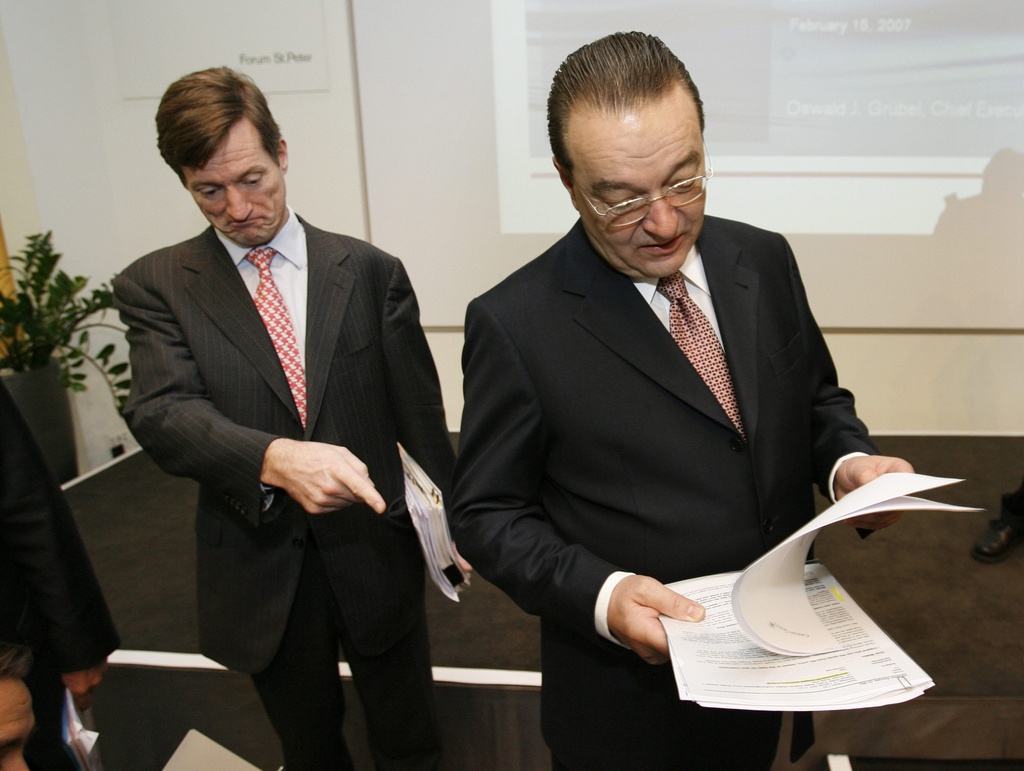
Downsizing reality hits over-confident banks

Switzerland’s big banks, UBS and Credit Suisse, are embarking on a round of job cuts and belt tightening having over-estimated the capacity of the markets to rise.
Credit Suisse was the latest global player to announce poor second quarter results on Thursday, following UBS two days before. Both banks will reverse recent hiring sprees with Credit Suisse shedding around 2,000 staff – roughly the same number it had just taken on.
Most of the major banking players around the world have either delivered recent poor results – or are expected to do so – as the financial markets continue to languish, contrary to expectations.
A combination of low interest rates and lack of risk appetite – as the European and United States debt crises fail to find resolution – have hit investment banking operations particularly hard.
UBS did not fail to disappoint on Tuesday, announcing a savings plan of up to SFr2 billion ($2.5 billion) and backtracking on its ambitious profit targets as profits fell 49 per cent year-on-year.
Bad wind
But Credit Suisse delivered one of the worst set of results so far, with net profits slumping 52 per cent on the same period last year to SFr768 million ($960 million).
“While we had hoped that [economic] headwinds would dissipate there are now significant signs that they could persist longer than we had hoped,” Credit Suisse chief executive Brady Dougan said at a press conference in Zurich on Thursday.
Bank Sarasin analyst Rainer Skierka also pointed to Credit Suisse’s private banking business that saw falling margins despite seeing SFr11.5 billion of net new assets flood in.
“Credit Suisse has hit the bottom of expectations, underperforming by 25 per cent to the consensus forecast [of analysts],” he told swissinfo.ch. “This was driven by a big miss in investment banking, but private banking is also proving not such a promising business as expected.”
Profits were also hit by a one-off SFr142 million charge in redundancy payments that are expected to reach up to SFr450 million.
Job cuts
Most telling, was a 59 per cent year-on-year drop in revenues and sales in the fixed income, currencies and commodities (FICC) business – a worst in class result so far this year.
FICC – that includes trading in securitised mortgage products – was the area hardest hit by the financial crisis and was thought by many banks to have hit rock bottom by 2009. Credit Suisse and UBS joined the race to boost this business with staff in the last year, only to find that the forecast rebound failed to find much bounce.
Credit Suisse chief financial officer David Mather hinted that most job cuts would hit the investment banking division, in which FICC is housed.
This hint was reinforced by Dougan who revealed that 500 jobs – a quarter of those at threat globally – would be lost in Switzerland. With around 40 per cent of all staff based in Switzerland, and Asia seen as the only reliable short term driver of growth, the US will most likely feel the highest proportion of cuts.
Franc weighs down
On top of the general poor market environment, the two big Swiss banks have also been hit by the strength of the Swiss franc. With a significant proportion of costs being booked in Swiss francs and nearly all revenues coming in the shape of the weakening US dollar, margins have been weakened.
Credit Suisse would have reported SFr348 million more in profits for the second quarter and an extra SFr637 million in the first half of the year had exchange rates been the same as they were in 2010, the bank said.
With the dollar dipping below SFr0.80 this week, there appears no end in sight to the problem. A ten per cent fluctuation in the franc-dollar exchange rate affects Credit Suisse profits by SFr375 million, whereas the same deviation in the euro “only” makes an impact of SFr85 million.
“The Swiss banks are definitely suffering more in this respect than their US rivals,” Skierka told swissinfo.
Adding to Credit Suisse’s problems is the escalating tax evasion conflict with the US authorities that has seen eight current or former employees charged and the bank itself given notification that it is being investigated.
Brady Dougan remained tight-lipped about possible outcomes, but acknowledged that such adverse publicity could not help but cause reputational damage. Although it paid a heavy price from its brush with the US authorities on the same subject, UBS can at least say it has put the issue behind it.
Credit Suisse reported a 52% drop in second quarter net profits (SFr768 million) compared with the same period last year. Revenues fell by a quarter to SFr6.32 billion.
Investment banking profits fell from SFr784 million in Q2 2010 to SFr231 million in the last three months.
Net new money coming into private banking totaled SFr11.5 billion.
UBS posted SFr1 billion profits in the second quarter, compared with SFr1.8 billion in the first three months of this year and SFr2 billion in Q2 2010.
Group revenues fell 14% from the first quarter to SFr7.2 billion.
Investment banking proved to be the biggest drag on numbers, with a 71 per cent year-on-year fall in profits to SFr376 million.
Net new money inflows amounted to SFr9.3 billion in the quarter.

In compliance with the JTI standards
More: SWI swissinfo.ch certified by the Journalism Trust Initiative






























You can find an overview of ongoing debates with our journalists here . Please join us!
If you want to start a conversation about a topic raised in this article or want to report factual errors, email us at english@swissinfo.ch.